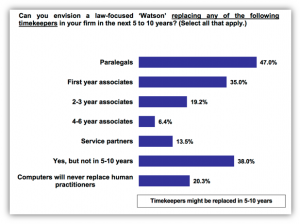Governança e Inovação
- - By : JPG
- Date : 30-Nov-16
- Leave a comment
Tive a honra de ser convidado e de participar do 23º encontro anual de sócios do TRIGUEIRO FONTES ADVOGADOS no ultimo dia 26/11, quando coordenei o workshop “GOVERNANÇA e INOVAÇÃO” onde foram apresentadas as novas tendências na governança de Escritórios de Advocacia e discutidas as bases para para o planejamento estratégico da empresa para o próximo quinquênio.
Obrigado e Parabéns ao TRIGUEIRO FONTES !
The NEW TRENDS in the LEGAL BUSINESS
- - By : JPG
- Date : 17-Nov-16
- Leave a comment
I was privileged to attend ILTACON 2016 (International Law Technology Association Conference) that, in this present edition, counted upon 3.500 participants (among speakers, listeners and exhibitors) and the main theme was: “Embrace the Change.”
The sole purpose of this introduction is to show to all those people engaged in the legal business in Brazil the extent and the concern of the international market with regard to the huge changes to which legal business is being recently submitted.
As it is expected, our Brazilian market strictly follows the world trends and more and more, the time-lag among the trends and the international events are narrowing.
This (international) market is being shaken by several forces to which it was not used to facing such as: financial pressure from the clients, a more and more competitive market, a bigger segmentation of the market itself, a significant and consistent decrease in billing/collecting, and, at last, a huge change in the behavior of the society with the “consumerization” of all services and products caused by the iphone effect in the word (where everything needs to be easy and intuitive).
In order to face those challenges, it is very urgent to totally reset the current model of the business, which, due to accommodation, is very inefficient and careless with regard to efficiency. The growing speed up of the technological development and the emergence of the so-called disruptive technologies are, on the one side, exerting more pressure in this “melting pot” but, on the other hand, they are offering (for those who have a prepared vision) a very interesting option in order to get adapted, to become more efficient and to get prepared for the near future changes, thus obtaining a competitive advantage in the market.
In addition to adopting those technological changes, the business will have to be managed in a different way and by people who have an open mind, who like the new, who have a great resilience and who have no fear of experimenting, making mistakes and learning. Only then the companies (and the law firms) will be prepared for the changes that the future holds for them and for us.
Several trends stands out in the technological field and all of them are strongly based on the Artificial Intelligence concept (“AI”) which is present in solutions such as Knowledge Automation, Legal Research, Contract Analysis, e-Discovery and Enterprise Search and also in forecast and prognostic systems. Among the 212 present companies (producers of software, equipment and services), 35 of them presented solutions involving artificial intelligence in some component, highlighting:
1- The ever increasing real and practical use (it is no longer a futurology exercise) of the computational learning concept, popularly known as “machine learning”, where mathematical algorithms are developed for specific tasks and that have the ability to self-adjust analyzing their own results and becoming more and more precise as time goes by.
2- The intensive use of the knowledge management (KM) in a more comprehensive way and involving the internal knowledge (explicit and tacit), the structural data (with the use of the BI tools), the competitor’s and the market data and information (Big Data) and more recently the statistics of Courts, Judges, judgments and theses.
3- More and more sophisticated tools (involving Artificial Intelligence) in the fight against the cyber crimes, the so-called “Cyber Attacks”, that already represent losses of billions of dollars in the North- American market.
4- Increasing adoption of the “data driven model” concept where the business is more and more managed with the help of systems that are focused on reports, statistics and structural data analysis of the companies. In this realm, the so-called information governance gain more and more space in the corporate governance, evolving from a utilization tool by the CID, CKO or COO to the most important tool of the CEO, being the base for the operational and strategic decisions.
5- Forecast or prognostic algorithms developed at Michigan State University are already able to estimate with 70% probability the decisions of the North-American Supreme Court and with 71% probability for correctness relative to the individual votes of the judges!
The Watson cognitive intelligence software designed by IBM beat, in 2011, the two previous champions of the TV program “Jeopardy!” and demonstrated at that time the power of the Artificial Intelligence. Since its introduction, its performance has evolved to over 2400%, it was the most important cognitive intelligence technology brought to the legal world and has been fostering dozens of initiatives (less costly) developed for specific solutions in the legal world, such as the ones previously referred to.
The trend for the use of the artificial intelligence in the legal world may be asserted by the graph shown below, where one shows the statistics of the answers to one of the questions posed in the survey made in March/April 2015 by Altman Well, Inc. directed to 797 “Managing Partners” of North-American firms (with over 50 lawyers) and answered by 320 0f them.

Copyright 2015 Altman Weil, Inc. All rights reserved
José Paulo Graciotti, is consultant and founding Partner of GRACIOTTI ASSESSORIA EMPRESARIAL, engeneer by Escola Politécnica Universidade de São Paulo, with Financial MBA at FGV and specialized in Knowledge Mnagement by FGV. ILTA Member since 1998 (International Legal Technology Association) and ALA (Association of Legal Administrators), with more than 27 years managing Law Firms in Brazil – www.graciotti.com.br
COMMITMENT OR INVOLVIMENT?
- - By : JPG
- Date : 07-Nov-16
- Leave a comment
Sometimes we use those two words as synonyms to indicate one of the most used subjective “KPI´s” to evaluate the dedication of a professional towards a company or an activity, but their meanings are different under the semantic point of view and brutally different under the professional evaluation point of view.
For me, the “COLLINS” dictionary shows us the best differences of these two words:
INVOLVEMENT1. uncountable noun Your involvement in something is the fact that you are taking part in it. 2. uncountable noun Involvement is the enthusiasm that you feel when you care deeply about something.
|
COMMITMENT1. uncountable noun Commitment is a strong belief in an idea or system. [+ to]. 3. countable noun [usu N to-inf] If you make a commitment to do something, you promise that you will do it. [formal] |
We clearly see that commitment is a much “stronger” attribute, as it subliminally involves a moral and ethical aspect in the participation process of a person in one activity.
It is really evident that all the companies want, like and need to have professionals who are committed to their teams in order to be more productive, efficient and competitive, mainly in time of crisis like the one we are going though right now. Just being hired or making part of a team already makes them involved and this is not enough.
 Professionally and in a very playful way, I consider that the best image we can give concerning the difference between these two words is the assessment of the participation of the two elements that make up the traditional “bacon n´eggs” breakfast. We have the chicken, that is involved into this process by providing the eggs and the pig, is committed with this process by giving its own life in order to provide the ham!
Professionally and in a very playful way, I consider that the best image we can give concerning the difference between these two words is the assessment of the participation of the two elements that make up the traditional “bacon n´eggs” breakfast. We have the chicken, that is involved into this process by providing the eggs and the pig, is committed with this process by giving its own life in order to provide the ham!
In addition to the aspect of synonymous use of the aforementioned attributes, there are other factors that, along the time, disqualified the importance in its use:
– The term commitment, due to its overexposure, that is, of its intense referral in almost all professional evaluation models, became worn out and lost the strength which is intrinsic to it.
– The lack of a clear definition (professional one) of which behaviors correctly characterize the commitment of a person within one organization.
– Also, as it is a subjective evaluation attribute, it is closely linked to the generation to which the evaluator belongs.
Examples: one evaluator that belongs to the “baby boomer” generation may consider (because he was evaluated like that) as a commitment to the dedication of the professional to the companies along the years, that is, how much time of his life he dedicated to the company, his punctuality, his attendance, etc. One evaluator that belongs to the “X” generation looks much more to the “guts” with which the professional faces his challenge and which is his efficacy of his dedication. Now, an evaluator of the “Y” generation may disregard the attendance and punctuality aspects (as he has grown in a connected and virtualized world) in his evaluation.
I do not mean with those arguments that the attribute should no longer be used in the subjective evaluations of the professionals but, instead, it must be used correctly!
First and foremost, in my opinion, the commitment attribute should not be used as an individual evaluator but, instead, as one intensifier of all other subjective attributes of evaluation, as any activity can be performed with higher or lower commitment.
Secondly, one must clearly define which characteristics or behaviors will be regarded as indicators of commitment so that the evaluators can get aligned and the evaluated persons will be become aware of it.
José Paulo Graciotti, is consultant and founding Partner of GRACIOTTI ASSESSORIA EMPRESARIAL, engeneer by Escola Politécnica Universidade de São Paulo, with Financial MBA at FGV and specialized in Knowledge Mnagement by FGV. ILTA Member since 1998 (International Legal Technology Association) and ALA (Association of Legal Administrators), with more than 27 years managing Law Firms in Brazil – www.graciotti.com.br





